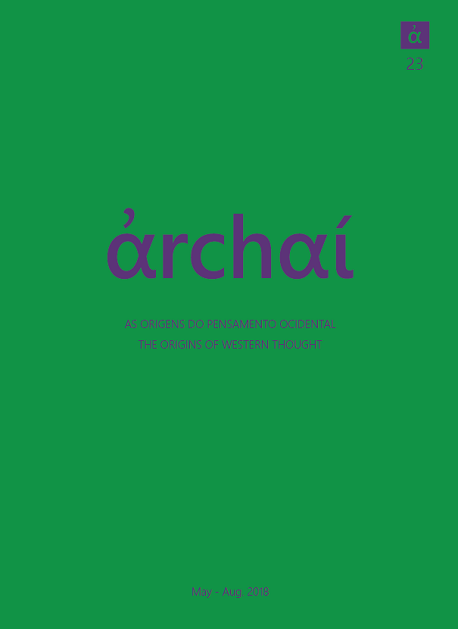Plato's theory of punishment in book IX of Laws
DOI:
https://doi.org/10.14195/1984-249X_23_2Keywords:
Plato, Laws, Punishment, Greek LawAbstract
The basis of moral responsibility is the central issue of Book IX of Laws, where Plato develops his theory of punishment, conciliating the Socratic thesis that no one is voluntarily bad (οὐδεὶς ἑκὼν κακοÌÏ‚), with the practical necessity for a gradation of penalties, the latter being derived from the traditional distinction between voluntary and involuntary offences. Distinguishing two independent aspects of crimes ”“ injury (βλάβη) and injustice (ἀδικίÌα) ”“ Plato argues that the former requires only restitution, whereas injustice calls for punishment, conceived as a measure to improve the soul, affected by disordered emotions or ignorance, causes of injustice.
Downloads
References
BRISSON, L.; PRADEAU, J. F. (2006). Platon. Les Lois (traduction, introduction et notes). 2 vol. Paris, GF Flammarion.
BURY, R. G. (1926). Plato. Laws (translation). Vol. IX and X. London, New York, Loeb Classical Library.
COHEN, D. (2005a). Theories of Punishment. In: GAGARIN, M.; COHEN, D. (ed.). The Cambridge Companion to Ancient Greek Law. Cambridge, Cambridge Univ. Press, p. 170-190.
COHEN, D. (2005b). Crime, Punishment and the Rule of Law in Classical Athens. In: GAGARIN, M.; COHEN, D. (ed.) The Cambridge Companion to Ancient Greek Law. Cambridge, Cambridge Univ. Press, p. 211-235.
ENGLAND, E. B. (1921) (ed.). The Laws of Plato. 2 vol. Manchester, The University Press.
GAGARIN, M. (2008). Writing Greek Law. Cambridge, Cambridge Univ. Press.
GAGARIN, M. (2011) (ed.). Speechs from Athenian Law. Austin, Univ. of Texas Press.
GÖRGEMANNS, H. (1960). Beiträge zur Interpretation von Plato’s Nomoi. Munchën, Beck.
HACKFORTH, R. (1946). Moral evil and ignorance in Plato’s Ethics. Classical Quartely, 40, p. 118-120.
MACKENZIE, M. M. (1981). Plato on Punishment. Berkeley, Univ. of California Press.
O’BRIEN, M. J. (1957). Plato and the “good conscience”, Laws, 863e5-864b7. Transactions of the American Philological Association, 88, p. 81-87.
ROBERTS, J. (1987). Plato on the causes of wrongdoing in the Laws. Ancient Philosophy, 7, p. 23-37. Also in: IRWIN, T. (ed). Classical Philosophy: collected papers. Vol. 3. Plato’s Ethics. (1995) New York, London, Garland Publishing Inc., p. 397-411.
ROBIN, L. (1950). Platon. Oeuvres Complètes (traduction et notes). 2 vol. Paris, Gallimard.
SAUNDERS, T. J. (1968). The Socratic paradoxes in Plato’s Laws. Hermes, 96 (3), p. 421-434. Also in: IRWIN, T. (ed.) Classical Philosophy: collected papers. Vol. 3. Plato’s Ethics. (1995). New York, London, Garland Publishing Inc., p. 383-396.
SAUNDERS, T. J. (1991). Plato’s Penal Code: Tradition, Controversy and Reform in Greek Penology. Oxford, Clarendon Press.
SHOREY, P. (1926). Book Review. Classical Philology, 23, p. 403-405.
STALLEY, R. F. (1983). An Introduction to Plato’s Laws. Oxford, Basil Blackwell.
TODD, S. C. (2005). Law and Oratory at Athens. In: GAGARIN, M.; COHEN, D. (ed.) The Cambridge Companion to Ancient Greek Law. Cambridge, Cambridge Univ. Press, p. 97-111.
TRELAWNY-CASSITY, L. (2010). Ten Tou Aristou Doxan: On the theory and practice of punishment in Plato’s Laws. Polis, 27, N. 2, p. 222-239.
WEISS, R. (2006). The Socratic Paradoxes and Its Enemies. Chicago, University of Chicago Press.
YUNIS, H. (2005). The Rhetoric of Law in FourthCentury Athens. In: GAGARIN, M.; COHEN, D. (ed.). The Cambridge Companion to Ancient Greek Law. Cambridge, Cambridge Univ. Press, p. 191-210.
Downloads
Published
How to Cite
Issue
Section
License
Given the public access policy of the journal, the use of the published texts is free, with the obligation of recognizing the original authorship and the first publication in this journal. The authors of the published contributions are entirely and exclusively responsible for their contents.
1. The authors authorize the publication of the article in this journal.
2. The authors guarantee that the contribution is original, and take full responsibility for its content in case of impugnation by third parties.
3. The authors guarantee that the contribution is not under evaluation in another journal.
4. The authors keep the copyright and convey to the journal the right of first publication, the work being licensed under a Creative Commons Attribution License-BY.
5. The authors are allowed and stimulated to publicize and distribute their work on-line after the publication in the journal.
6. The authors of the approved works authorize the journal to distribute their content, after publication, for reproduction in content indexes, virtual libraries and similars.
7. The editors reserve the right to make adjustments to the text and to adequate the article to the editorial rules of the journal.



